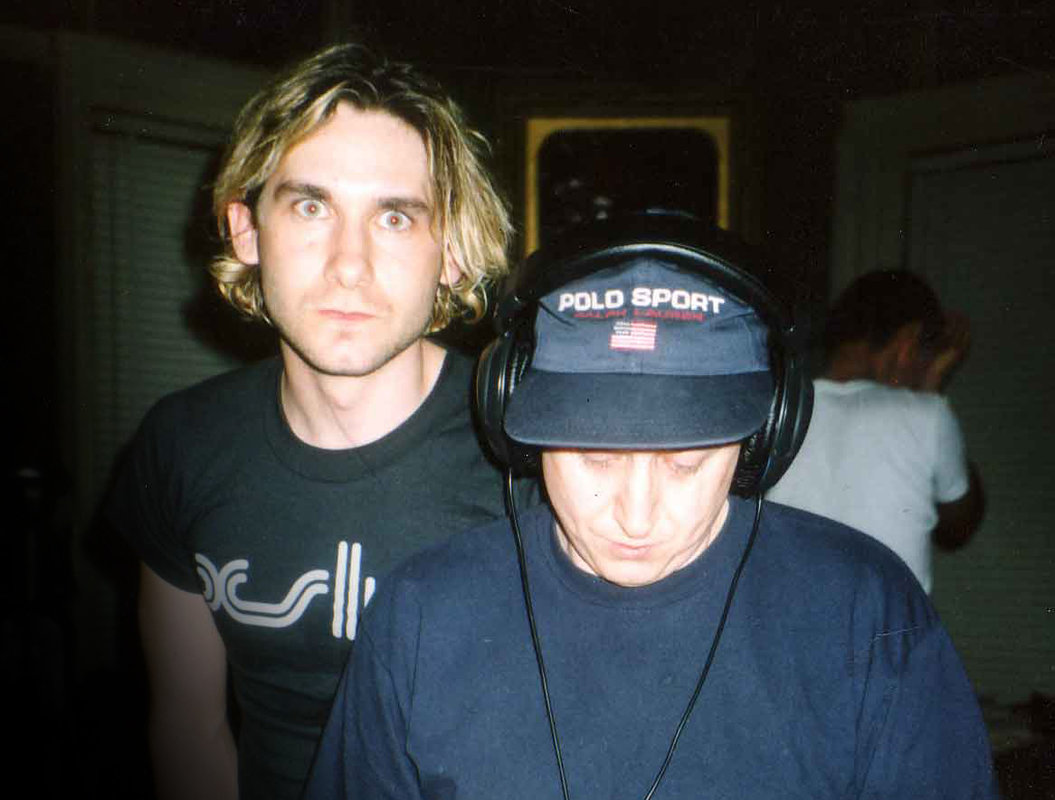
Here we have an interview with two of London’s finest gentlemen - Frank Broughton and Bill Brewster. With the reissue and updated version of their book (or the bible as it’s known in these parts) ‘Last Night A DJ Saved My Life’ which comes with a new introduction by James Murphy of LCD fame it felt like a good time to catch up with the chaps. We spoke the week after a recent Low Life party which Bill and Frank helm and which is always a good time… Some of the images you see below come from the first and fourth parties Bill and Frank threw together in Harlem in '95 and '96, which retrospectively became Low Life.
Test Pressing: That was good party the other night…
Bill Brewster: Yeah, it was good. Fun wasn't it?
Test Pressing: I think I left at half four, but it was still popping away. Frank you left early as you were going away…
Bill: I dropped him off at the airport.
Test Pressing: You went straight to the airport?
Frank: Yeah. I got one hour sleep and then went snowboarding. I managed to catch COVID as well.
Bill: Quite hardcore
Test Pressing: Right… I've actually prepared. I know I shouldn’t be proud of that bearing in mind this is an interview… So, tell me, where did you first meet? An easy one…
Frank: Broadway and Bond? What was it Bill? Was it ’93?
Bill: It was ’94.
Test Pressing: What’s that a bar or something?
Frank: It’s the street corner. Bill had an amazing office with a big oval window. So you'd walk down Broadway and then you'd get to see the street and then there'd be this big oval window and lots of record mailers and cardboard pressed against the glass.
Bill: It was DMC's office.
Test Pressing: So that's when you were at DMC Bill and were you just visiting Frank?
Frank: No we lived there for three and a half years. I was ducking and diving. I was a painter and decorator to start with. I went out there at the end of 1990. I’d lost my job working on a Robert Maxwell magazine when he was starting to steal and embezzle. So, me and the lady I was seeing, June Joseph, who was a journalist, she'd written for a bunch of IPC titles. She'd done a bit for NME and a bit for i-D and we went to live in New York.
Test Pressing: What was the magazine you were writing for?
Frank: I was working on a magazine called Rage in 1989, which was like a kind of indie dance sort of mag. Happy Mondays and stuff… Riding that wave.
Test Pressing: I think I vaguely remember it…
Frank: It was like a kind of rave Smash Hits and Gary Crowley edited it.
Test Pressing: Right. He comes across well. Always seems like a good guy.
Frank: He’s lovely, yeah. A really nice guy.
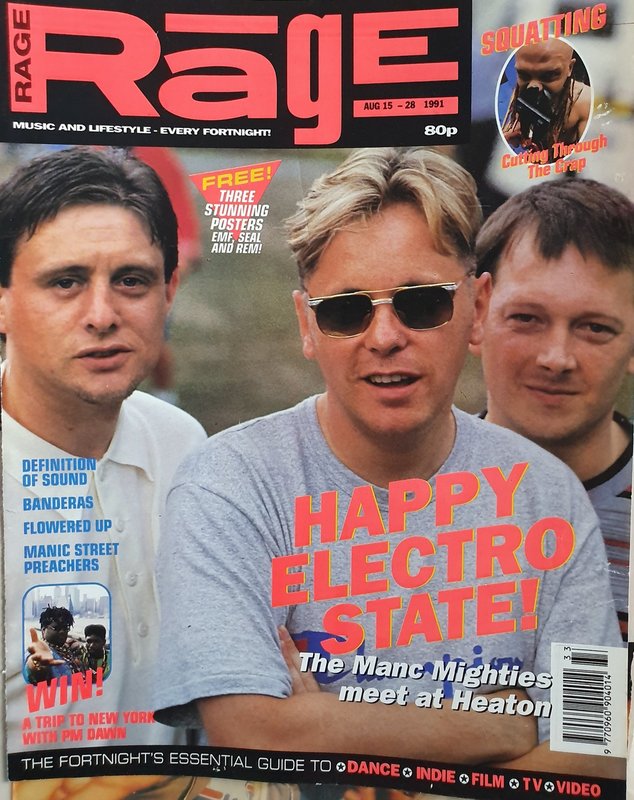
Test Pressing: So Bill, you were at DMC then for, well, you were there for a number of years.
Bill: Yeah, I'd been working for When Saturday Comes, the football magazine, and I left that late summer ’93 and DMC offered me a job. So I went to edit Mixmag Update in the UK. And I did that for about eight months and then this job came up in New York and they said, ‘Do you want go out and run the office in New York?’ So, so I said, ‘Yeah’. And then about a week after I moved there, Frank, who had been working as a stringer (someone that writes for a magazine but isn’t on the payroll - Ed) for Mixmag just came in and introduced himself. And I met Frank and Adam Goldstone within maybe two or three days of each other, but they both just presented themselves to me.
Test Pressing: What a combo.
Bill: Yeah. I know. And obviously, you know when you meet Adam for the first time… It leaves a lasting impression. So within a couple of weeks all of us were hanging out together.
Frank: Yeah, by the time Bill was there, I was sending stories home to Mixmag and i-D and Hip Hop Connection. I was doing loads of stuff for Hip Hop connection. The record companies weren't sending so many journalists on trips anymore so I got quite a lot of work. And that was really how I started as a writer was just doing lots of little interviews for those magazines. Before Bill was there, I was working for Update USA. I used to review the CDs. And then Bill turns up and he is my new boss.
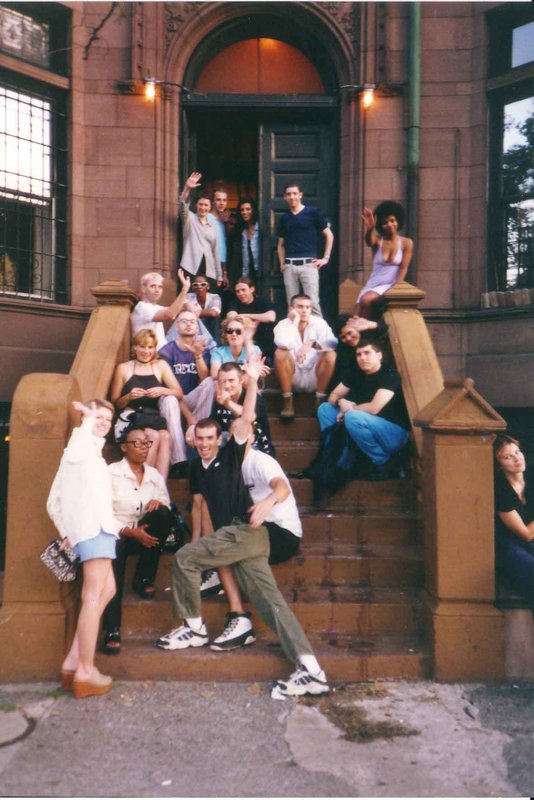
Test Pressing: So New York was still pretty lively at that point…
Frank: It was brilliant. You always hear stories and sort of wish you'd been there five years earlier but loads of stuff was going on. It was a really exciting time actually. I mean by ’94 Giuliani (mayor of New York) was just getting in but he hadn't really started cleaning things up and there'd been a real explosion. In New York, traditionally clubs and bars were quite different. So you didn't really get music bars where…
Bill: Well the one night thing didn't really exist in New York, having different DJs playing in one night. That was really a London thing. In New York it was like, this is the club. This person plays on that night and there are no guest DJs.
Frank: It's still a bit sketchy in my memory but I think around then was the first time people started doing one nighters in bars and you'd get like a little weird Brazilian night or a jungle night, so all these little genres started having their own nights.
Bill: What really kicked things off in a big way was when Twilo opened and they had Sasha and Digweed playing. I think that's when, culturally, that British idea of guest DJs started really happening a big way.
Frank: We'd go to the Sound Factory. We loved that. I mean there was still some massive old classic things going on… Like Frankie Knuckles used to play The Roxy, which is like a 2,000 - 3,000 capacity roller rink. So he'd play that on Saturday night and then you'd go to the Sound Factory afterwards for the after hours…
Bill: And also Frankie had a residency at The Sound Factory bar on a Friday still. And Louis Vega was resident on a Wednesday… What is funny is that most of the stuff that we personally experienced doesn't really get a look in in the book. We don't really cover that because even though that was our experience when we lived in New York, it wasn't really the story of the development of the DJ. The development had happened earlier in a lot of ways in New York.
“We’d go to the Sound Factory. We loved that. I mean there was still some massive old classic things going on… Like Frankie Knuckles used to play The Roxy, which is like a 2,000 - 3,000 capacity roller rink. So he’d play that on Saturday night and then you’d go to the Sound Factory afterwards for the after hours…“
Test Pressing: Why did you decide to write the book in the first place? It's great to see it back but how did the idea for the book come about originally?
Frank: Originally it was going to be a sort of oral history of disco. It came from just overhearing and listening to guys talking about the earlier days and then you'd meet people in The Sound Factory who'd been clubbing for decades and just get great stories about ’70s and ’80s clubland. So we kind of felt someone should document this and we actually formulated it as a book idea. It wasn't until we were back in the UK several years later and we did a book for The Ministry of Sound called ‘The Manual’ which was a bit like a potted clubland history. Then on the back of that, the publisher said, ‘Well, do you wanna do a book? Have you got any books that you'd like to do that are a bit more personal?’
Test Pressing: Right…
Frank: So we did the disco one, which was the stories we wanted to tell which were these sort of old stories of the seventies and eighties New York clubland, and we kind of framed it like, ‘It’s between ’69 with the Stonewall riots and gay liberation and the early eighties when AIDS started killing so many New Yorkers.’ But our editor Doug Young had the brilliant suggestion of ‘Why don't you do the whole history of the DJ?’ So we just expanded the scope. Once we'd got that idea of such a massive subject that we could own, the light bulb went on and we went for it. It was that feeling that we could really, go to town on this. There were a few books that had covered little sections of it, like histories of radio or David Toop’s book on hip hop or Matthew Collin’s book… So I think we realised the scope of this massive story by putting the DJ in the middle of it made it a much bigger story than anyone else would really want to take on. So we got megalomaniac about it.
Test Pressing: So who was the first interview and why did you start there?
Frank: Well, that's a good question. I dunno. Can you remember Bill? We got together and we sort of plotted it out. We sort of vaguely knew the goal in terms of sort of cultural transmission.
Bill: We did actually put together quite a detailed chapter plan and I found it not that long ago and the chapter plan isn't that far away from what we actually did. A lot of the early ones we did would've been in September, October, November in 1998 and they were some of the ones that were nearest to us really.
Frank: You started talking to northern soul people, didn't you Bill?
Bill: Yeah, I drove around the north for a few days. I stayed at my mum's house and then drove to Mansfield and Blackpool and various other places and interviewed northern soul DJs. But I mean, the thing is when you interview one person they'll always say, ‘Oh, you should talk to so and so because they were doing it before me’ or ‘Talk to this person because they know more about that than I do’. In that sense it really became an oral history because you are guided by the people you interview and that's how we built up the picture really.
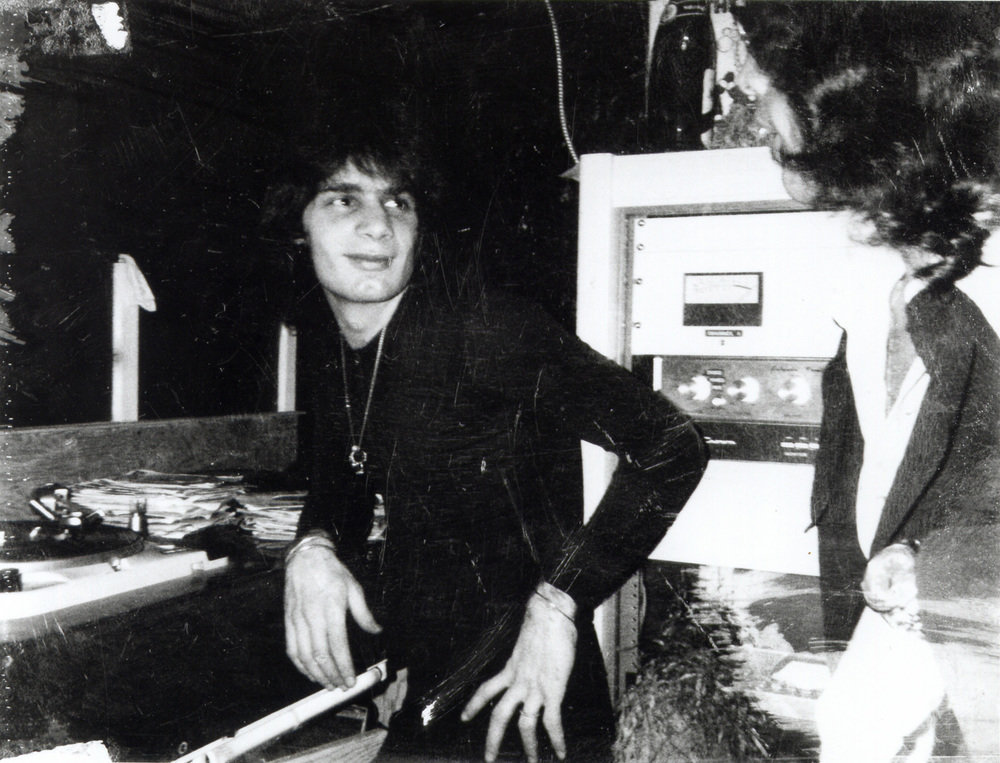
Frank: Exactly… And then they tell you who inspired them and gradually you go back to the source and that's how we found Francis Grasso. I don't think at that point there had been a mention of his name anywhere…
Bill: I think he is in the Albert Goldman book…
Frank: Ah yes. Albert Goldman's Disco! was a great source when we found that.
Test Pressing: See, I remember getting a photocopy of that from you Bill because that was quite rare. Like the internet kind of wasn't around to find those things back then.
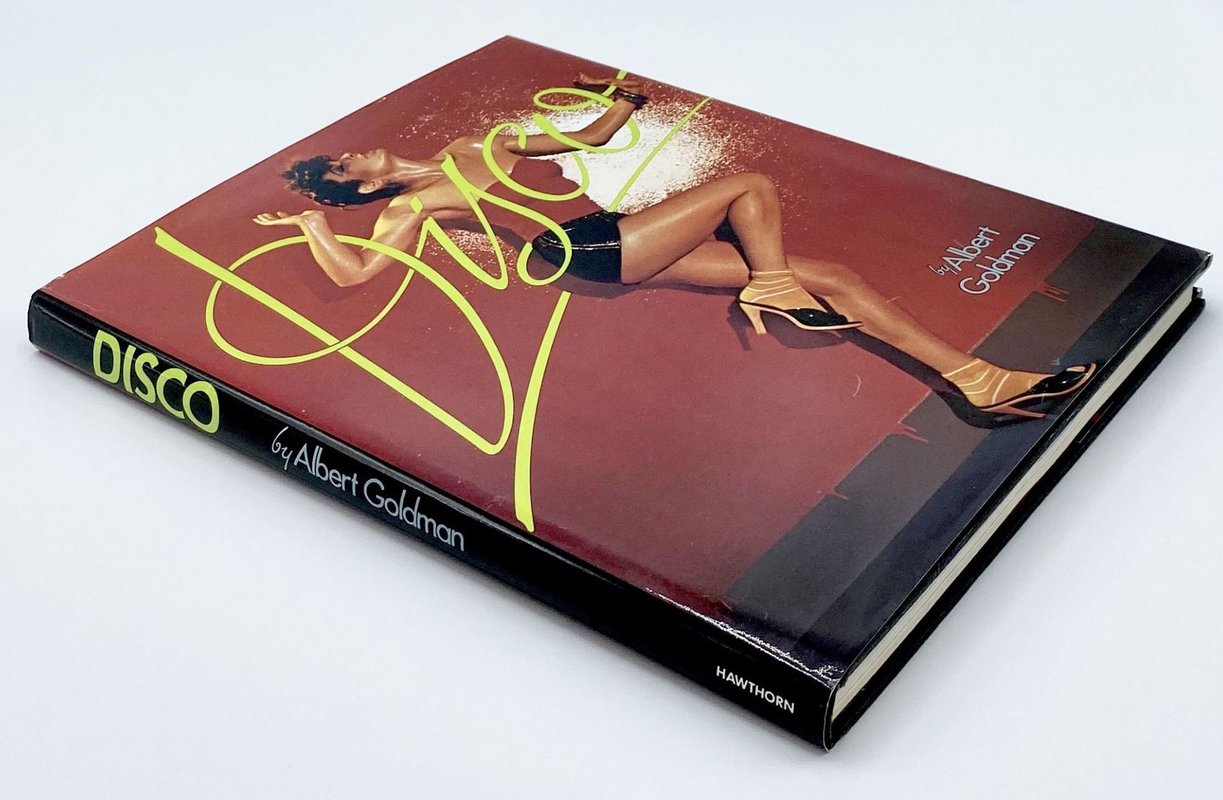
Bill: It wasn't no. It was completely useless for us in terms of writing a book. There was no research information on there at all. So everything we did was either in the British Library, the Performing Arts Library in New York, newspaper library or bits that we'd collected ourselves over the years or firsthand accounts really. So it was all super old school.
Test Pressing: What do you think is the most insightful interview in the book and why? I mean, obviously it's a big patchwork story that all comes together, but is there one that you really like the detail in?
Frank: There were some that were just amazing storytellers. I think there's a guy Sal Abbatiello who ran a hip hop club called Disco Fever. So I'm in the Bronx and where the club used to be. I don't think there was any signage or anything left, but it's in his office and he's just one of those fantastic Italian-American storytellers. And he just starts telling you these stories and he's describing people… Like he's describing Grandmaster Flash there on a Tuesday night and Lovebug another night and the stories were just great.
Bill: Haha. Yes. People doing lines of coke on the bar and yeah he's very vivid the way he describes things. Ian Dewhirst is an amazing storyteller as well. And the king acid house storytelling is Fabio. It’s not just the way he explains things, but he really understood a lot of the undercurrents of what was going on then and he was really good at expressing the political element of acid house. So I guess it's people that have had the experience, but are also able to articulate it, which strangely, is a gift in itself. You know, you meet some people that also hit the backlog of stories that they have…
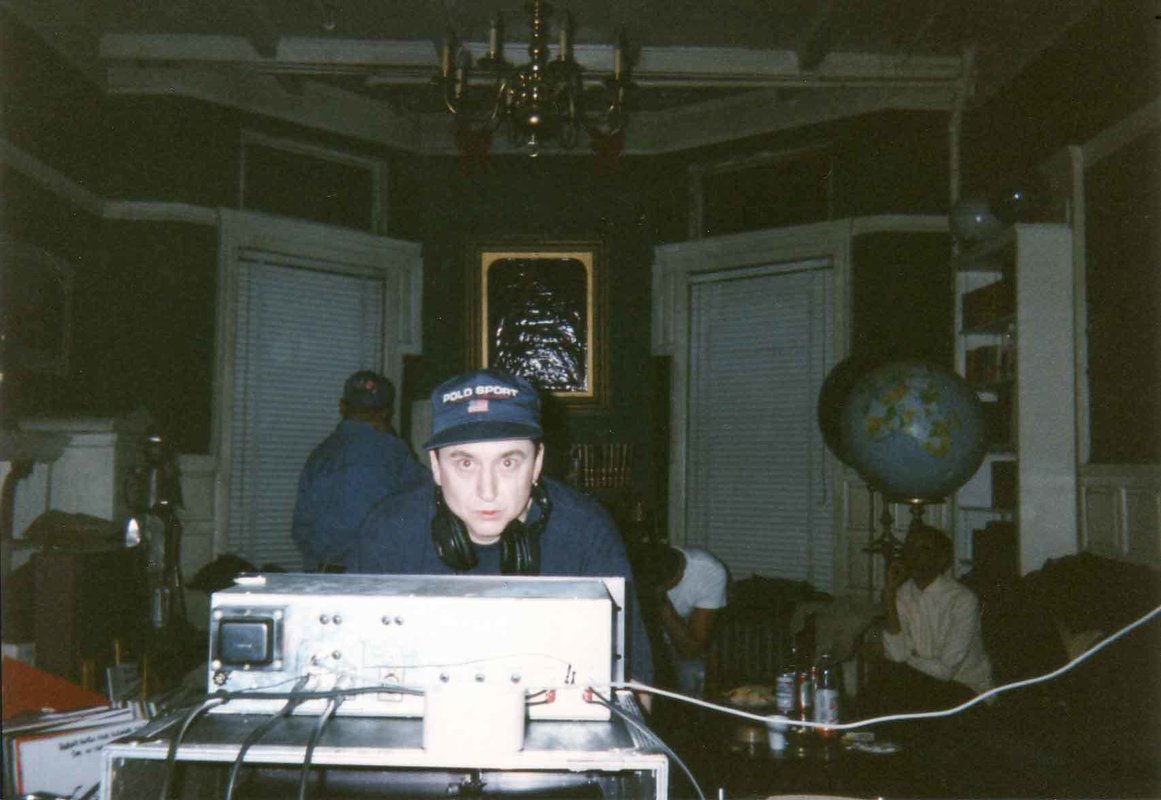
Test Pressing: Or they tell you the good ones once you've stopped recording. That’s one of the problems with interviewing people who are older and have properly done it. How do you stop people going into auto pilot?
Bill: The one thing I've learned about interviewing is to shut your trap and let them talk really. Because sometimes they'll talk themselves into where you want to go if you let them carry on. Sometimes you can feel a bit impatient, like stop waffling about this and just tell me about the thing I wanna know. But I think sometimes you've just gotta kind of be patient and sort of let them ramble a bit before they get to the thing that you need.
Frank: Sometimes you've got to get them off a well worn path. Some people have told their stories so many times you've got to kind of trip them up a little bit and try and make them remember something rather than actually just spill out a story that's happened and for me I think that I was always asking people about descriptions of things like, ‘What was it actually like? What was the atmosphere like? What was the lighting like?’ so that you could imagine it and picture it. And then in the book we really tried to recreate some of those places and someone said, ‘Aren’t you a bit young to have been to all those clubs?’ And we were like, ‘Well, we haven't been to half of them. We're just describing them from other people's memories.’
Test Pressing: After all your research and interviews what was the one club that each of you would like to go back to?
Bill: Music Box in Chicago or the Paradise Garage. I suppose the two obvious ones, but then I'd have loved to have been at some of those sixties clubs like The Twisted Wheel. That sounds amazing as well.
Frank: I’d add The Roxy as well. When it was the climax of kind of early hip hop when Bambaataa and the Zulu Nation were playing there, when all the punks would come from the east and the kids would come down from the Bronx and you had this like complete, proper melting pot, which I don't think hardly happened in New York before or since.
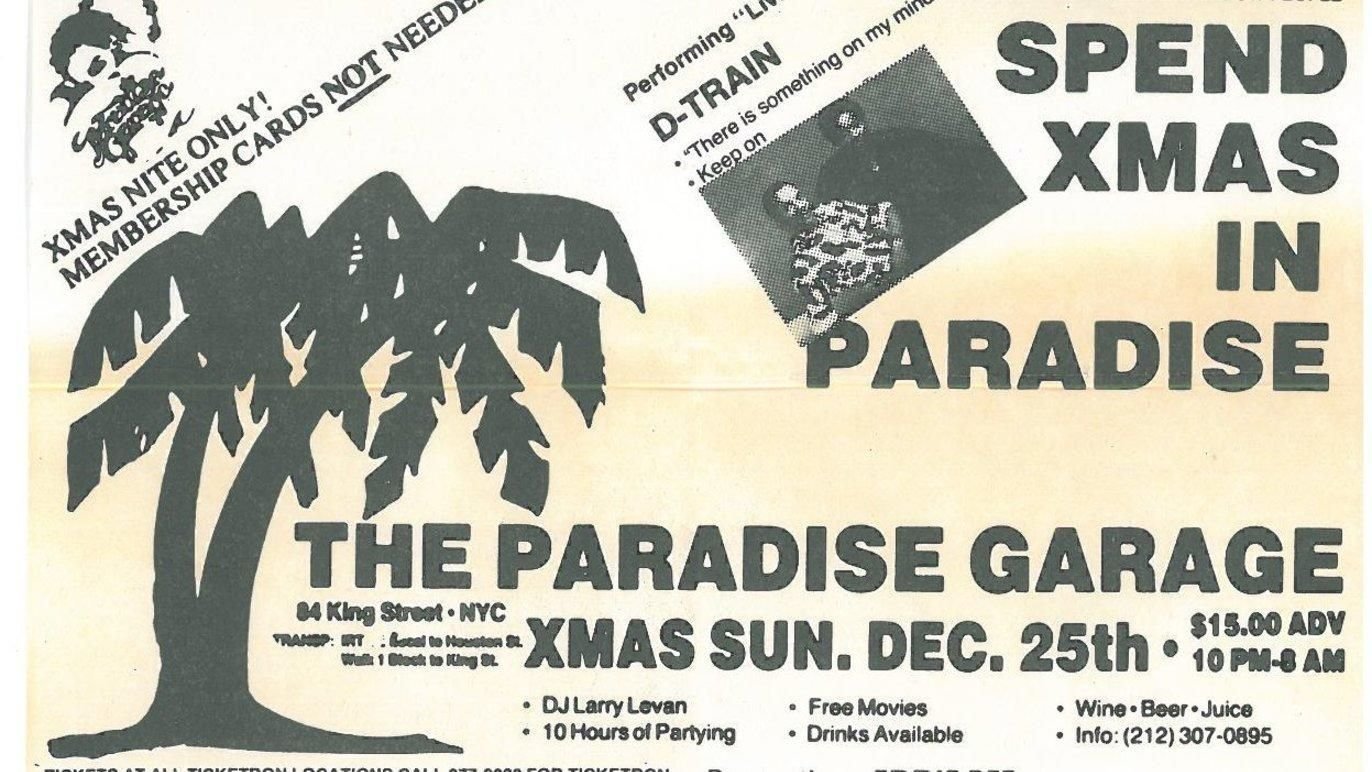
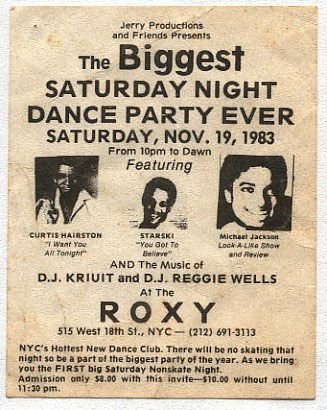
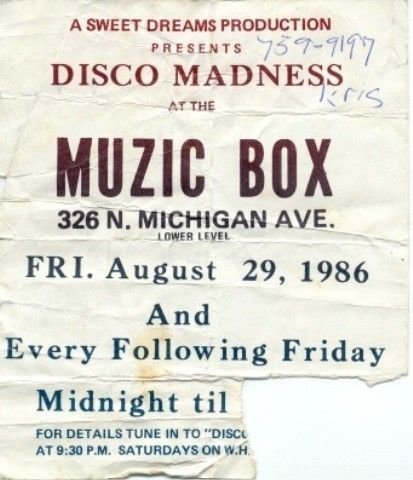



Bill: There’s a lot of kind of accidental collisions. What's funny about hip hop is because of the sort of economic and social isolation not many people knew was going on in different areas… I think most of them were pretty unaware of what was going on in Manhattan. I'm not sure that someone like Flash knew about it at all. He was in his own neighbourhood, completely unaware that there was a revolution going on somewhere else. So even though they were like a few miles apart in some ways it felt like they were decades away from each other. That leads to something I love about New York and that’s the way these DJs would break these records and they would be huge before anyone could even get a copy. You knew them really well. And you knew all the words of the songs but didn’t even necessarily know the name of the record.
Test Pressing: There was a really good interview that I listened to with Trevor Nelson on Romesh Ranganathan… Nelson’s talking about DJing and it was really good as it wasn’t in an angry old man way, but he's just saying about how when he was younger, the DJ would play a record and you'd struggle to find out what it was. Then you’d struggle to go and get the thing once you found out what it was, whether it's on import or a UK thing… These days you Shazam it and can then be listening to it pretty much immediately on a phone. That’s nuts. I walked around record shops with lists with my mates when we were little trying to search out tunes Weatherall had played.
Frank: I think to some degree it's decent. What we've got now is decentralised isn't it? So there's so many records and so many edits and so many people making their own music. There just aren't those records that filter through in quite the same way. I mean there’s a few but we just don't have that same consciousness. There'd be records like ‘French Kiss’ that would just stick around for years.
Bill: That era is definitely gone because essentially for many, many years most DJs were playing from the same tranche of records that were available. There were maybe 50 records coming out every week. So there were a limited amount of releases and you knew the big ones. You might not necessarily like them all, but you'd know what they were. Whereas now it's completely impossible to keep up with any of it. It's just preposterous. But you are more able to create something personally unique to yourself nowadays by editing things or finding records that are quite obscure or that have passed people by. There's a few records I've got that nobody else seems to have and no one's playing. You do find those. You just have to look a bit harder really. By the same token, there are brilliant records that are coming out every week that you miss and that's what I love. I love doing the Furtive 50 at the end of the year because I'm like, ‘oh God, I have no idea about this record that everyone else has been playing all year’. So yeah, there's good things and bad things about it.
Test Pressing: The Furtive 50 must be quite interesting now because I can't imagine many get the same votes anymore…
Bill: Yeah, the top 20 is accurate, but beyond that, it gets to be a bit of a murky pond.
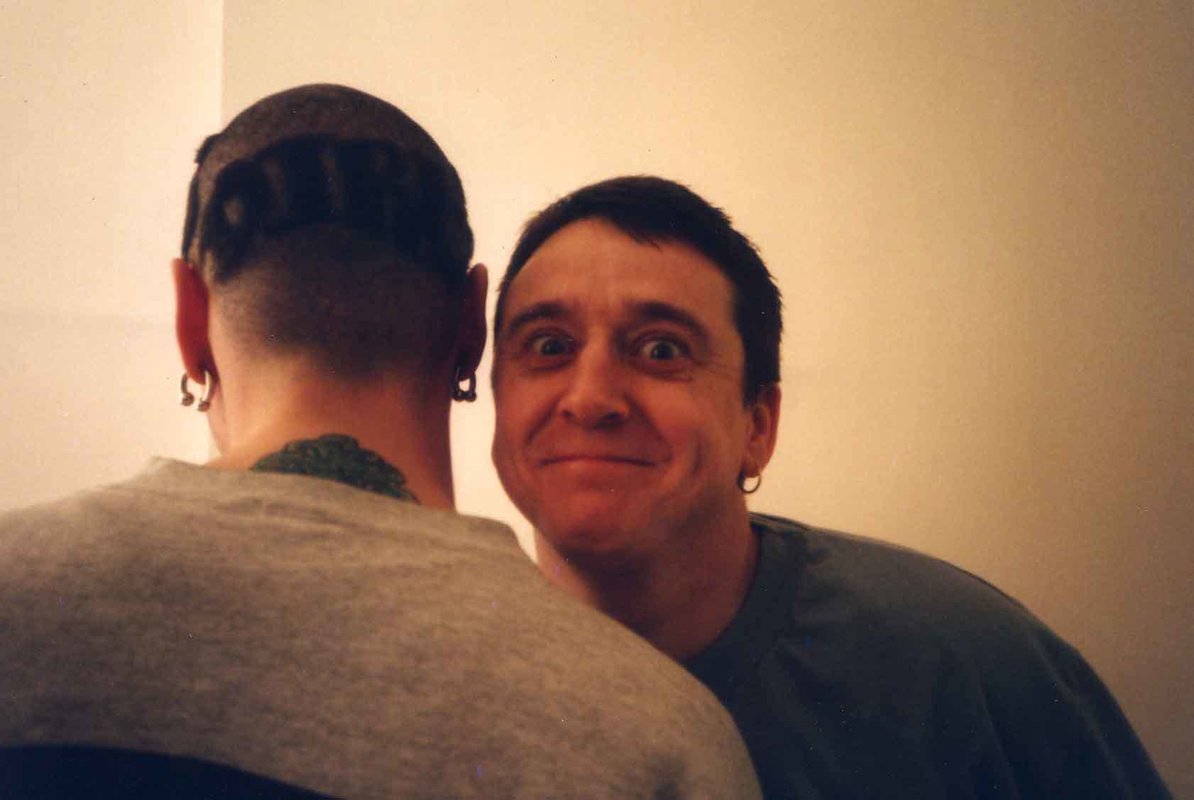
Test Pressing: So back to the book… It's incredibly deep, but who didn't you get to interview that you wanted to?
Bill: Shep Pettibone and Jellybean Benitez are two that I would've really liked to interview. Shep Pettibone is a bit reclusive and at the time Jellybean was kind off the scene really. I've actually spoken to him in the past month about interviewing him. But it's a bit late now for the book unfortunately…
Frank: I remember sending a lot of faxes to Jellybean and getting strange answers from his PA.
Bill: He’s one of those people that straddled different eras. He was there during disco and then through electro and then early house music. He went through all of it. Also, he was the first DJ to get signed to a major label as a DJ, I think. So he is a pretty important figure.
Test Pressing: What was the furthest distance you traveled for an interview?
Bill: We flew over to New York to interview people… I don't think we interviewed anyone outside of New York did we Frank?
Frank: I'd done a big story about Chicago for i-D when Prescription and Relief were the big new Chicago labels. So I interviewed Cajmere and all those people but I'd also made a big point of talking to as many of the earlier people and getting stories about the origins of the scene there. So Chicago is probably a little bit further. I guess the Francis Grasso story is probably the luckiest. It wasn’t a mad distance to travel when we were in New York but it’s just the fact that we only found him because his name was in the phone book.
Test Pressing: No way.
Frank: Nobody knew whether he was alive or dead and we just had this name and there was a Francis Grasso in the phone book and I just rang it and he said, ‘Yes, I am that man’.
Test Pressing: That must have been amazing walking up to ring that doorbell…
Frank: I met him in a bar in Brooklyn at 10 in the morning and we started drinking beer…
Bill: It was really sad. He killed himself about three years after the book came out. He was working in construction. Actually when he died, we got an email from one of his friends saying thank you so much for documenting his life in your book. And we're glad that people know who he is. I don't know what his personal reaction was, but certainly his friends were really happy that that he'd been recognised.
Test Pressing: I think thats testament to you guys really. You both really manage to convey an energy with your writing. Sometimes people write books about music and periods of music or whatever and it’s clearly written from a scholarly perspective. Like this person has never ever been off their heads on a dancefloor properly losing it to a record they love. Whereas your books are always really exciting and convey the energy of a dancefloor and what makes it great…
Frank: It’s that voyeurism isn't it? I think we both, when we are writing about some of those older places, are just excited and try to imagine ourselves there and try and recreate it. That's hopefully what comes over in the book is that but there's only a certain level of detail that we want to go into. I guess that's a lucky result of taking on such a big subject. If we had made it just about disco maybe it would've been a bit more boring because we'd have gone into more detail about particular ins and outs and happenings. Whereas, because we've got this whole scope, that's more than a hundred years, you sort of keep it focussed.
Bill: You don't have time to hang around too much if you want to get all of the information in. So you kind of have to zip quite quickly from one bit to another.
Frank: And also we really put a lot of quotes in. Most of the chapters have got one big mouth in it who you want to just quote at length. So we did. And it's like, why not? Because if they can recreate it, it's like meeting them. We weren't approaching it from a very academic point of view. We wanted to be truthful and accurate but we didn't let that get in the way of a good story.
Test Pressing: Well, see, I think it's the fact that you two also spent a lot of time on dance floors. Just getting what it's all about and that's the difference, you know?
Bill: Yeah. We've had a lot of experience of dancing and, and you know DJing and I love going out to clubs. I'm 62 now. I still get a buzz at going to a great party. It's brilliant.
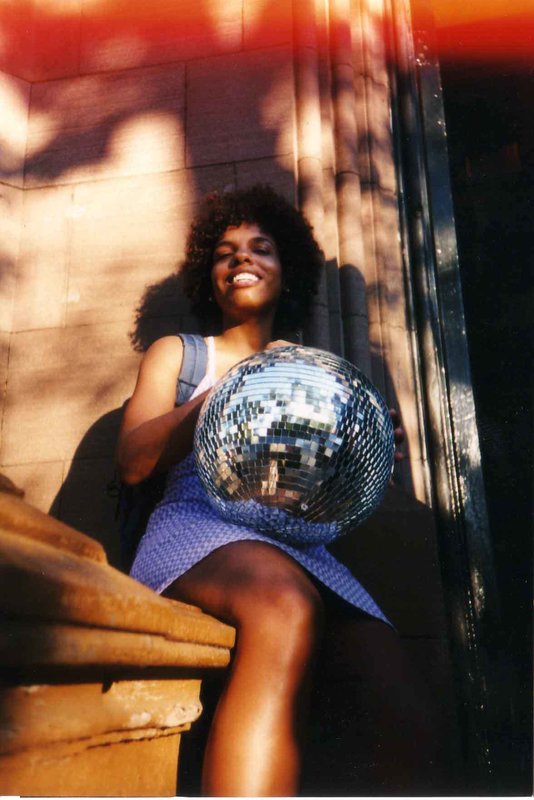
Test Pressing: Well you run a great party in Low Life too…
Bill: Yeah. I guess that kind of helps when you know a good party. It does help. But essentially we got so much inspiration from talking to all these other people that have thrown great parties as well. It kinda helped us.
Frank: When you are talking to someone about a club that was before you were born and you knew that people were going for the same reasons and doing the same things and they had the same things on their mind as you do when you go to a club. So it's that sort of empathy of realising that there's nothing new under the sun. I think you realise that through history that's always happened and the same impulses have been at play.
Test Pressing: So just to round off then what struck you when you went back through the book to update it to its current edition?
Frank: Well, we wanted to bring it up to date for a new readership. So we got people to read it who could read it from a much younger perspective and tell us what was wrong with it and what was right with it. And luckily, most, most of the comments were like, you know, ‘this is pretty good’. But it held a mirror up to us about the lack of women's voices in the book and I think it is a very male story and, and there's nothing that's gonna change that from a historical perspective. The nature of the story was that we were tracing this single line of transmission or, or maybe slightly multiple lines. So you've got different genres and different things, but essentially we were going from the people in the present going backwards, hand over hand, like a relay race and all those people were men.
This time round though we've had more room to put in people who weren’t that central in our original story and the obvious thing is that there were always women DJs who weren't necessarily handing the baton on down to the next person who would make big noises, but they were always there. Sharon White was someone we tried to interview, but she’s unavailable to do any interviews at the moment.
Test Pressing: Excuse my ignorance but where did she play?
Frank: Well, she's an amazing figure when you uncover what she did, because she was really out of all the DJs that played at The Paradise Garage, apart from Larry Levan, she probably played it more than anyone. She played at The Saint, she had a residency there but she was a big part of the Garage. She lived the closest. So when Larry didn't show, she was the most likely to get the call. So she's the only DJ that played in those two completely polar opposite sides of New York gay life in the eighties. If you listen to her mixes they're amazing. She was an amazing DJ. She was in the first book. We name-checked her and we talked about her, but this time we were able to tell her story and she was such a pioneer in that scene. So yeah, we've added a lot of women's voices. That's the biggest difference.
Test Pressing: Anything else we should look out for in the new edition?
Bill: Well, there are two new chapters but it feels as much tighter as a book. We spent quite a lot of time actually going through and editing it and making it a bit tighter. And we did that because we didn't have much room to add new material. We had to edit before we could write really. So we spent quite a lot of time tightening up the book in general and obviously if you've read it before you’ll recognise lots of things in it, but I think there's enough in there to justify buying it again and thinking, ‘yeah this is far better’.
Test Pressing: Real pleasure to chat about this with you chaps.
Bill: Welcome.
Frank: Cheers.
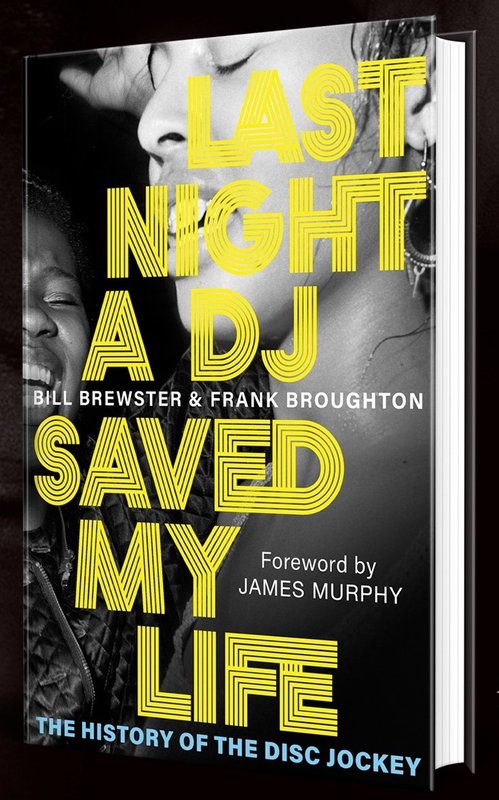
The updated, expanded and revised edition of 'Last Night A DJ Saved My Life' is available in all good shops now on White Rabbit with a brand new foreword by James Murphy of LCD Soundsystem. It is the one book on the history of dance music everyone should own and pore over (in my humble opinion).


